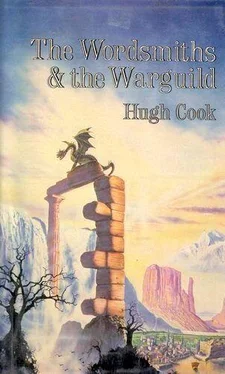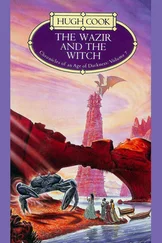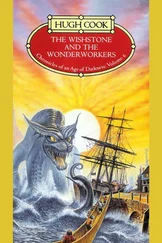Hugh Cook - The Wordsmiths and the Warguild
Здесь есть возможность читать онлайн «Hugh Cook - The Wordsmiths and the Warguild» весь текст электронной книги совершенно бесплатно (целиком полную версию без сокращений). В некоторых случаях можно слушать аудио, скачать через торрент в формате fb2 и присутствует краткое содержание. Жанр: Фэнтези, на английском языке. Описание произведения, (предисловие) а так же отзывы посетителей доступны на портале библиотеки ЛибКат.
- Название:The Wordsmiths and the Warguild
- Автор:
- Жанр:
- Год:неизвестен
- ISBN:нет данных
- Рейтинг книги:4 / 5. Голосов: 1
-
Избранное:Добавить в избранное
- Отзывы:
-
Ваша оценка:
- 80
- 1
- 2
- 3
- 4
- 5
The Wordsmiths and the Warguild: краткое содержание, описание и аннотация
Предлагаем к чтению аннотацию, описание, краткое содержание или предисловие (зависит от того, что написал сам автор книги «The Wordsmiths and the Warguild»). Если вы не нашли необходимую информацию о книге — напишите в комментариях, мы постараемся отыскать её.
The Wordsmiths and the Warguild — читать онлайн бесплатно полную книгу (весь текст) целиком
Ниже представлен текст книги, разбитый по страницам. Система сохранения места последней прочитанной страницы, позволяет с удобством читать онлайн бесплатно книгу «The Wordsmiths and the Warguild», без необходимости каждый раз заново искать на чём Вы остановились. Поставьте закладку, и сможете в любой момент перейти на страницу, на которой закончили чтение.
Интервал:
Закладка:
The sanity of the mountains had made him, within the terms of the world he had escaped from, quite mad.
Togura the Prophet, bearer of an uncommonly optimistic Revelation, gained the uppermost heights of the Ironband Mountains. It was noon, on a clear, bright day, with the sun at its zenith and somewhat to the south; despite the sunlight, it was cold, for at this height there still remained patches of snow and slush, the last debris of winter. Togura surveyed the view, and gave himself three cheers – one for initiative, one for effort and one for success.
Then, in a moment of arrogance quite contrary to the tenor of his Revelation, he declared:
"I, Togura Poulaan, lord of all I survey, name this summit Mount Togura. I name these uplands the Togura Heights, claiming all for me and mine for all eternity."
Having thus annexed his territory, he then had the problem of whether to call himself baron, earl, duke, prince, king or emperor.
"Lord Emperor Togura," he said, announcing his choice aloud. "Master of All the Mountains, their Surrounds, and Surrounding Oceans."
That had a nice ring to it. He celebrated his bloodless imperial conquest by eating a little smoked horsemeat, chewing it slowly while he admired the view. At his rear, to the north, lay the lowlands of Estar. On his right, to the west, in the distance, the Central Ocean. On his left, more mountains. And to the south? Ahead of him, to the south, there were lowlands of some kind. The Harvest Plains, he hoped.
As Togura gazed down at the southern lowlands, which were in fact the Lezconcarnau Plains, the wind started to get up. it was cold; shivering, he started downhill. By late afternoon, the sun had clouded over; by evening, a grey, persistent drizzle was dampening down his spirits. Nevertheless, he was not despondent. He found a scratch of a cave which would give him a dry night, and, with the competence of a seasoned traveller, lit a fire and made a brilliant blood-warming blaze from damp wool.
The next few days were difficult.
The going was very slow. The southern side of the mountain range proved to be steep, dangerous and heavily wooded. Where he could, he followed winding animal tracks through the trees, as the undergrowth, surfeited with nettles and brambles, proved uncommonly inhospitable. Once he sighted a wild pig, a monstrous wild-haired razorback boar; prudently, he climbed a tree. Finding a rotten log which had been torn open, apparently by heavy-duty claws, he suspected the presence of bear. He found deer tracks, and then paw marks like those of a wild-cat, only much larger.
Though this should by rights have been the sunnier side of the range, the heavy vegetation made it cold, dank and shadowed. Often, stooping down a deer track with crowding branches overhead, he would go for half a day through unbroken twilight. Then the trees would end with a burst of sunlight, revealing the gash of a gorge, the looming depths of a massive sink hole, or a sheer cliff plummeting down to bone-breaking rocks.
Running into such obstacles, Togura had to sidetrack and backtrack. Every day gave him at least five good reasons for sticking to the Salt Road. Still, he was here, now – he had to find a way to the south, or starve. He cut his rations down to almost nothing, and persisted.
Finally, to his delight, he found a small river with a track running alongside it. The track was overgrown, as if nobody had come this way for a season or so, but, with the help of a stout stick with which he could beat down the more unruly outcrops of nettles, he could follow it. He did so, for the river ran south.
Early on the second day downriver, he rounded a riverbend, eager to get a clear view of a massive red brick edifice whiche he had glimpsed through the trees. He was rewarded by the sight of the river running downstream for half a league or so until it disappeared into a gap in one wall of a castle.
The castle, a massive pentagon of red brick, many times taller than the surrounding trees, was surmounted by a pyramid, also built of red brick. There was no sign of any gate or door; only slit windows pierced the brickwork. Togura gawked at it – then realised he could be seen from those slit windows.
He ducked down out of sight behind some shrubbery, but, after a moment, rose to his feet again. The surrounds were so overgrown that the castle could scarcely be inhabited. He had seen no huntsmen or herdsmen, no farms or fields, no charcoal burners, no woodcutter clearings, no beggars or wandering lunatics; he had seen no roads and no woodsmoke, and no paths barring the single overgrown rivertrail he was following; the area was, as far as he could tell, a deserted wilderness.
Boldly, Togura set off down the riverpath. He was half way to the castle when an arrow thunked into a tree just beside his head. Togura had scarcely had time to react when half a dozen men downriver broke cover. They were a bunch of hairy individuals with bows, spears and wildskin clothes. As they shouted at him, he turned and fled. They pursued, gaining on him easily. Their laughter came scarpering after him.
Another arrow slammed into a spindly tree-trunk just in front of him. Togura dropped his baggage, but still they gained on him. Whooping ferociously, they closed in for what sounded very much like the kill. Despairing of escape uphill, Togura jumped into the river. It was cold, swift and deep. It swept him away toward the castle.
Floating in the water, Togura saw his pursuers turn and start to trudge down the riverpath. They seemed in no hurry. He wondered why. Looking downriver, he saw the castle was much, much closer. Its walls blocked up the sky ahead of him. Suddenly he did not like the look of the gaping black hole in the castle wall which was swallowing the river. It looked cold, dangerous and nasty.
Togura struck out for the riverbank. But the current was too strong for him. Momentarily, he gained a hold on a slimy rock near the water's edge. Then the current plucked him away and channelled him into the darkness. The daylight rapidly slid away from him. Hearing a thunderous water-rumble up ahead, he guessed that there was a weir or waterfall waiting for him. Desperately, he struck out for the bank, fearing that it would be a wall of sheer rock.
His fears had no foundation. He found that the bank, which was low, was made of something spongy which tore, broke and crumbled as he kicked and clawed, fighting free from the water. Once on the bank, cold, shivering and dripping wet, he tore away another handful of the spongy substance underfoot and held it up to the light. The diminished illumination showed him something looking grey, unpleasant and unhealthy; he dropped it.
Togura did not know it, but he was standing on a vast, lethal, carnivorous fungus. By now he had kicked several holes in it, and had torn away chunks of its substance. Usually, it did not take kindly to such cavalier treatment; in the usual course of events, it would have eaten away his legs by now, and would just have been making a start on his testicles. However, this was one of its rare periods of dormancy, which lasted for twelve days and occurred once in every three hundred and thirty-three years. So, for the moment, he was safe.
Walking upstream, Togura was met by a solid wall running flush with the river. Going downstream, he met the same. He realised he was standing on a kind of landing bay. There was no path by the river. He could trust himself to the water, which thrashed into thunder in the darkness ahead, but he suspected that would be suicide – or at least a severe form of masochism. The alternative was to see if there was a tunnel, stairway, chimney or sump leading away from the landing bay.
Togura wandered about in the dark, bumping into things, swearing, shouting to test the echoes, and falling into holes. One of the larger holes dropped him down so sharply that he almost broke his leg. He got off with a sprained ankle. Hobbling about, swearing more viciously than ever, he found, at last, a stairway, which he climbed.
Читать дальшеИнтервал:
Закладка:
Похожие книги на «The Wordsmiths and the Warguild»
Представляем Вашему вниманию похожие книги на «The Wordsmiths and the Warguild» списком для выбора. Мы отобрали схожую по названию и смыслу литературу в надежде предоставить читателям больше вариантов отыскать новые, интересные, ещё непрочитанные произведения.
Обсуждение, отзывы о книге «The Wordsmiths and the Warguild» и просто собственные мнения читателей. Оставьте ваши комментарии, напишите, что Вы думаете о произведении, его смысле или главных героях. Укажите что конкретно понравилось, а что нет, и почему Вы так считаете.












